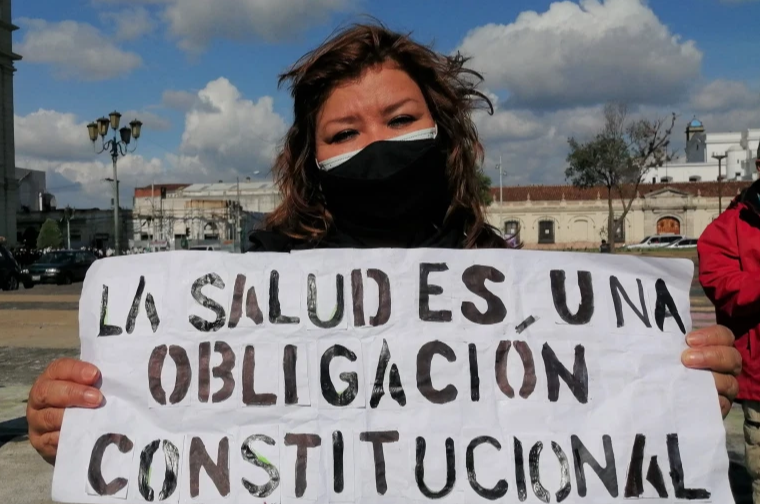
A protester holds a sign that reads 'Health Is A Constitutional Right' during a rally in Guatemala City. [Sandra Cuffe/Al Jazeera]
Guatemala City, May 13 (RHC)-- Maria Zita arrived before dawn. She had her required appointment confirmation but with reports of large crowds and confusion at some Guatemala City COVID-19 vaccination sites, she wanted to make sure she got her jab.
“We arrived at five o’clock in the morning,” Zita, 70, told Al Jazeera outside a sports complex building in the Guatemalan capital, where her son stood with her at the front of a short line before vaccinations began at 8 a.m..
Up-tempo music from a nearby outdoor aerobic dance class played as more people trickled into line. Army Health Service personnel arrived and joined civilian health workers at the site, where an official told Al Jazeera they expected to administer 300 doses that day. Zita was the first.
COVID-19 vaccinations got off to a late and rocky start in Guatemala, driving growing discontent over vaccine access, pandemic management and alleged corruption issues. Initially, the problem was getting vaccines into the country but now the issue is getting doses into arms before they expire.
Vaccine inequity between higher- and lower-income countries is an ongoing global concern but disparities also exist across Latin America. While jabs are well under way in four countries, Honduras, Nicaragua and Guatemala lag far behind as they some of the lowest vaccination rates in the region.
There are political and technical reasons for Guatemala’s vaccine woes, explained Oscar Chavez, the director of Laboratorio de Datos, a non-governmental group founded last year to disseminate and analyse data related to the pandemic and propose solutions.
“It is a management crisis,” Chavez told Al Jazeera. “The problem here is that when there were no vaccines, [the government] did not prepare cold storage, vaccine centres, or personnel.”
Guatemala has received 658,200 total vaccine doses in five shipments since late February. More than 90 percent has been AstraZeneca’s Covishield vaccine, two-thirds of it through the COVAX global mechanism for vaccine equity. Early donations from Israel and India and an initial delivery last week of Sputnik V doses round out the total.
But only a little more than one-third of all vaccine doses have been administered to date. As of Wednesday, 230,431 people – less than 1.5 percent of the population – had received their first dose and only 2,518 people were fully vaccinated.
Meanwhile, Guatemala has 321,600 Covishield doses that it has not administered which will expire in June, Minister of Public Health and Social Assistance Amelia Flores said on Tuesday during a hearing with congressional representatives.
Based on last week’s rate of vaccination, Laboratorio de Datos calculated it will take more than two months to administer those doses. That means that if the pace of vaccination does not significantly pick up soon, some will expire.
Guatemala only began negotiations for vaccines in the last few months of last year. It also did not develop a vaccination plan or enact legislation facilitating contracts with manufacturers until January.
Its only contract to date – for 16 million doses of the Sputnik V vaccine – was signed last month. Guatemala paid $79.5 million for the first half of those vaccines and an initial shipment of 50,000 doses arrived last week.
In liquid form, Sputnik V vaccines must be stored at -18 degrees Celsius and once doses are removed from the fridge, they must be administered almost immediately. Due to current limitations in cold storage capacity, the vaccines will be administered to urban populations, the health minister has said.
However, there are nowhere near eight million urban adults in Guatemala; close to half of the estimated 17.9 million inhabitants are minors and nearly half the population is rural. Health ministry officials did not respond to Al Jazeera’s question on the matter in time for publication.
The Special Anti-Corruption Prosecutor’s Bureau has opened an investigation into alleged anomalies in the Sputnik V procurement process, the public prosecutor’s office announced last week. There have been sporadic corruption scandals throughout the pandemic, from early revelations of a fraud ring inside the health ministry to more recent cases of fraudulent test purchases.
“I do not have any confidence in the government,” said Monica Posada, a primary school teacher who has been struggling with online classes because her students often lack internet access. Posada attended a protest with her three daughters over the weekend in Guatemala City, where people marched and rallied against the government, demanding vaccines and condemning pandemic-related corruption.
“I am indignant,” Posada told Al Jazeera during a demonstration on Saturday in the city’s central plaza. “The government is playing with the health of the people.”

